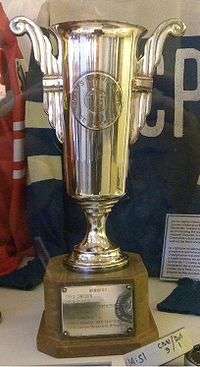1957 World Ice Hockey Championships| Tournament details |
|---|
| Host country |
.svg.png) Soviet Union Soviet Union |
|---|
| Dates |
24 February–5 March |
|---|
| Teams |
8 |
|---|
| Venue(s) |
Luzhniki Palace of Sports |
|---|
| Final positions |
|---|
Champions  |
 Sweden (2nd title) Sweden (2nd title) |
|---|
Runner-up  |
.svg.png) Soviet Union Soviet Union |
|---|
Third place  |
 Czechoslovakia Czechoslovakia |
|---|
| Fourth place |
 Finland Finland |
|---|
| Tournament statistics |
|---|
| Matches played |
28 |
|---|
| Goals scored |
300 (10.71 per match) |
|---|
| Attendance |
223,700 (7,989 per match) |
|---|
| Scoring leader(s) |
.svg.png) Konstantin Loktev 18 points Konstantin Loktev 18 points |
|---|
|
|
The 1957 Men's Ice Hockey World Championships were held between 24 February and 5 March 1957 at the Palace of Sports of the Central Lenin Stadium in Moscow, USSR.

Trophy awarded for the 1957 World Championships
This was the last World Championships played on natural ice; and were the first World Championships held in the USSR and they are remembered for the political circumstances surrounding the games. Hungary had been recently occupied by the Soviet Army (to suppress a revolution in October and November 1956), and as a result, the United States and Canada boycotted the World Championships in protest. Joining them were Norway, West Germany, Italy and Switzerland. East Germany participated at the top level for the first time.
Competition
With the boycott, the home team USSR was heavily favoured to win the tournament, but Sweden surprised the world by pulling off an upset. The first step was taken in their third game, when they beat Czechoslovakia 2-0. This important victory was saved by the head of Leksands IF defenseman Vilgot Larsson. He literally headed the puck away from the Swedish net to save a goal, and in the days before mandatory helmets, received several stitches for his heroics. In the final game, Sweden opened with two goals, but the dynamic Soviets responded with 4 goals of their own. Down by two in the third period, goals by Eilert Määttä and Erling Lindström tied the game, and the goaltending of Thord Flodqvist and play of Sven "Tumba" Johansson guaranteed the final draw. The USSR had previously only tied Czechoslovakia, so all Sweden needed was one point, or a tie, for gold.
Karel Straka, of Czechoslovakia, was named best goaltender. Nikolaï Sologubov, of the USSR was best defenceman, and Sven "Tumba" Johansson of Sweden was best forward. Konstantin Loktev, of the USSR, led all scorers with 18 points (on 11 goals and 7 assists), followed by Nils Nilsson and Ronald Pettersson of Sweden, both with 16 points. Vsevolod Bobrov, of the USSR, led all scorers with 13 goals. Japan, competed for the first time since 1930, and finished last with one point in the standings.
Standings
Final round
| 24 February | Soviet Union .svg.png) | 16–0
|  Japan Japan | |
| 24 February | Czechoslovakia  | 9–0
|  Austria Austria | |
| 25 February | Soviet Union .svg.png) | 11–1
|  Finland Finland | |
| 27 February | Sweden  | 2–0
|  Czechoslovakia Czechoslovakia | |
| 27 February | Soviet Union .svg.png) | 22–1
|  Austria Austria | |
| 28 February | Czechoslovakia  | 3–0
|  Finland Finland | |
| 28 February | Soviet Union .svg.png) | 10–1
|  Poland Poland | |
| 2 March | Soviet Union .svg.png) | 2–2
|  Czechoslovakia Czechoslovakia | |
| 4 March | Czechoslovakia  | 25-1
|  Japan Japan | |
| 5 March | Czechoslovakia  | 12-3
|  Poland Poland | |
| 5 March | Soviet Union .svg.png) | 4-4
|  Sweden Sweden | |
Attendance record
The final game (USSR versus Sweden for the championship) was played on the football field of the Grand Sports Arena of the Luzhniki Stadium. It is reputed that over 50,000 fans (or 55,000, depending on sources) fans saw the game, the most ever for an international hockey game. This stood as the world record until 6 October 2001, when 74,544 fans saw Michigan State University and the University of Michigan play an American NCAA Hockey game outdoors at Spartan Stadium in East Lansing, Michigan.
European Championship medal table
Games played against Japan did not count for the purposes of determining the European champion. Since six of the seven European participants defeated Japan, and since the only opponent that did not defeat Japan (Austria) also lost to each of their European opponents, finishing order for the European championship table was the same as it was for the main championship table.
Tournament awards
- Best players selected by the directorate:
Citations
References
- Complete results
- Duplacey, James (1998). Total Hockey: The official encyclopedia of the National Hockey League. Total Sports. pp. 498–528. ISBN 0-8362-7114-9.
- Podnieks, Andrew (2010). IIHF Media Guide & Record Book 2011. Moydart Press. p. 135.
See also

 Karel Straka
Karel Straka.svg.png) Nikolaï Sologubov
Nikolaï Sologubov Sven Tumba
Sven Tumba